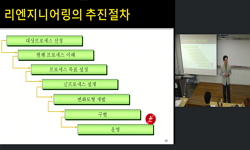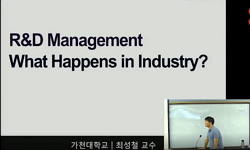Purpose: Existing precedent studies include success factors of individual management innovation activities constantly. However, those studies have limitations about the common key success factors of individual management innovation activities. Methods...
http://chineseinput.net/에서 pinyin(병음)방식으로 중국어를 변환할 수 있습니다.
변환된 중국어를 복사하여 사용하시면 됩니다.
- 中文 을 입력하시려면 zhongwen을 입력하시고 space를누르시면됩니다.
- 北京 을 입력하시려면 beijing을 입력하시고 space를 누르시면 됩니다.

국내 경영혁신 활동의 핵심 성공요인 문헌 연구 - 6시그마, TQM, 린 6시그마, ERP, TPM, BPR, Project Management, System Engineering 중심으로 - = Literature Review of Key Success Factors of Management Innovation Actions in Domestic - Focused on Six Sigma, TQM, Lean Six Sigma, ERP, TPM, BPR, Project Management, System Engineering -
한글로보기https://www.riss.kr/link?id=A102131436
- 저자
- 발행기관
- 학술지명
- 권호사항
-
발행연도
2016
-
작성언어
Korean
- 주제어
-
등재정보
KCI등재
-
자료형태
학술저널
- 발행기관 URL
-
수록면
639-648(10쪽)
-
KCI 피인용횟수
4
- DOI식별코드
- 제공처
-
0
상세조회 -
0
다운로드
부가정보
다국어 초록 (Multilingual Abstract)
Purpose: Existing precedent studies include success factors of individual management innovation activities constantly. However, those studies have limitations about the common key success factors of individual management innovation activities. Methods: For this study, we investigate the key success factors using literature research of the most typical management innovation activities adopted and implemented by many companies in Korea, such as 6sigma, TQM, Lean 6sigma, ERP, TPM, BPR, Project Management, System Engineering. Factors emerging repeatedly was combined into common factors and inherent factors that are necessary for the success of individual management innovation activities are designated to essential factors. Results: ‘Essential factors for Six Sigma’consist of 5 items. Black belt operating system, personnel management system linkage, the correct management of the data, perform improvement projects associated with financial performance financial result, linked to financial performance improvement project, project progress management. ‘Essential factors of TQM’ are arranged 4 items. Quality team’s independence and role, goal-setting, Quality Information System, corporate’s philosophy of quality first. ‘Essential factors of Lean Six Sigma’are the selection of value stream which is based on the customer needs and the value creation and identify the project based on the selected value in the company. ‘Essential factors of ERP’are investigated 6 items. Ongoing system maintenance and upgrades, the measurement and support of user satisfaction, the operating systems and the policies for the maintenance, IT infrastructure, change adaption condition monitoring, focusing on improving business performance. ‘Essential factors for TPM’are arranged 4 items. Motivated and energetic Bottom-Up, CEO’s recognition of the importance facility management, long term perspective of necessity and ongoing patience. ‘Essential factors for BPR’are the pursuit of change process and the staff’s sense of crisis management. ‘Essential factors for Project Management’are the strategy that reduce the risk management skills through risk management and the understanding and organized management for the project participant’s needs. ‘Essential factors for System Engineering’consist of 2 items. The first is the design for the best balanced system with pre-analysis about the compromise the cost, schedule and the performance. The second is the analysis of large problem into small problems which can solved. We have found the solution considering components of the interface through the systematic perspective. Conclusion: Common factors and essential factors presented in this study will properly help to introduce the individual management innovation activities for the each business sector and implement management innovation. After this study, new literature research that reflect new studies should accomplish steadily.
참고문헌 (Reference)
1 문제옥, "현장 작업자를 위한 6시그마 DMAIC 추진 방법론 사례" 대한설비관리학회 15 (15): 51-60, 2010
2 신동설, "블랙벨트를 통해 본 6시그마 성공의 핵심 요인에 관한 실증적 연구" 한국품질경영학회 31 (31): 81-94, 2003
3 문제옥, "기존 6시그마에 린 생산방식을 접목한 린 6시그마의 추진 방법론" 대한설비관리학회 14 (14): 83-90, 2009
4 문제옥, "공공부문의 6시그마 프로젝트 개선안 실행력 제고를 위한 핵심 성공요인" 대한설비관리학회 16 (16): 45-52, 2011
5 문제옥, "경영혁신을 위한 린 6시그마 활동의 효과적인 전개방법에 관한 연구" 한국벤처창업학회 10 (10): 63-71, 2015
6 George, M. L., "Lean Six Sigma : Combining Six Sigma Quality With Lean Speed" McGraw-Hill 2002
7 Je-Ok Mun., "A Study on Executability Enhancement of the Six Sigma Projects in Public Sectors" Ajou University 2012
8 Je-Ok Mun., "A Study of Method of Lean Six Sigma Deployment" Ajou University 2004
9 Jung-Sik Kim., "A Comparison Between TPM and RCM on the Maintenance Planning" 25 (25): 31-43, 1997
10 조지현, "6시그마 핵심구성요소 선정" 한국품질경영학회 34 (34): 22-32, 2006
1 문제옥, "현장 작업자를 위한 6시그마 DMAIC 추진 방법론 사례" 대한설비관리학회 15 (15): 51-60, 2010
2 신동설, "블랙벨트를 통해 본 6시그마 성공의 핵심 요인에 관한 실증적 연구" 한국품질경영학회 31 (31): 81-94, 2003
3 문제옥, "기존 6시그마에 린 생산방식을 접목한 린 6시그마의 추진 방법론" 대한설비관리학회 14 (14): 83-90, 2009
4 문제옥, "공공부문의 6시그마 프로젝트 개선안 실행력 제고를 위한 핵심 성공요인" 대한설비관리학회 16 (16): 45-52, 2011
5 문제옥, "경영혁신을 위한 린 6시그마 활동의 효과적인 전개방법에 관한 연구" 한국벤처창업학회 10 (10): 63-71, 2015
6 George, M. L., "Lean Six Sigma : Combining Six Sigma Quality With Lean Speed" McGraw-Hill 2002
7 Je-Ok Mun., "A Study on Executability Enhancement of the Six Sigma Projects in Public Sectors" Ajou University 2012
8 Je-Ok Mun., "A Study of Method of Lean Six Sigma Deployment" Ajou University 2004
9 Jung-Sik Kim., "A Comparison Between TPM and RCM on the Maintenance Planning" 25 (25): 31-43, 1997
10 조지현, "6시그마 핵심구성요소 선정" 한국품질경영학회 34 (34): 22-32, 2006
동일학술지(권/호) 다른 논문
-
- 한국품질경영학회
- 서상원 ( Seo Sangwon )
- 2016
- KCI등재
-
- 한국품질경영학회
- 이민희 ( Minhee Lee )
- 2016
- KCI등재
-
- 한국품질경영학회
- 손찬영 ( Chanyoung Son )
- 2016
- KCI등재
-
시각 모델을 고려한 인지 대비 측정 및 영상품질 향상 방법에 관한 연구
- 한국품질경영학회
- 최종수 ( Choi Jong Soo )
- 2016
- KCI등재
분석정보
인용정보 인용지수 설명보기
학술지 이력
| 연월일 | 이력구분 | 이력상세 | 등재구분 |
|---|---|---|---|
| 2026 | 평가예정 | 재인증평가 신청대상 (재인증) | |
| 2020-01-01 | 평가 | 등재학술지 유지 (재인증) |  |
| 2017-07-01 | 평가 | 등재학술지 선정 (계속평가) |  |
| 2017-07-01 | 평가 | 등재후보로 하락(현장점검) (기타) |  |
| 2015-01-01 | 평가 | 등재학술지 유지 (등재유지) |  |
| 2011-01-01 | 평가 | 등재학술지 유지 (등재유지) |  |
| 2009-01-01 | 평가 | 등재학술지 유지 (등재유지) |  |
| 2007-01-01 | 평가 | 등재학술지 유지 (등재유지) |  |
| 2006-01-03 | 학술지명변경 | 외국어명 : 미등록 -> Journal of Korean Society for Quality Management |  |
| 2005-01-01 | 평가 | 등재학술지 유지 (등재유지) |  |
| 2002-01-01 | 평가 | 등재학술지 선정 (등재후보2차) |  |
| 1999-07-01 | 평가 | 등재후보학술지 선정 (신규평가) |  |
학술지 인용정보
| 기준연도 | WOS-KCI 통합IF(2년) | KCIF(2년) | KCIF(3년) |
|---|---|---|---|
| 2016 | 0.88 | 0.88 | 0.8 |
| KCIF(4년) | KCIF(5년) | 중심성지수(3년) | 즉시성지수 |
| 0.93 | 1 | 0.751 | 0.38 |





 ScienceON
ScienceON KISS
KISS






